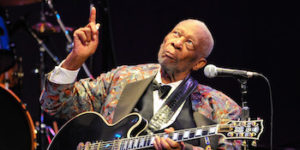
B. B. King
*B. B. King was born on this date in 1925. He was a Black blues guitarist and singer-songwriter.
Riley B. King was born to a poor family of sharecroppers living on the Mississippi Delta, near the town of Itta Bene, MS. King's home life was very unstable, and as a child, he picked cotton to help with the family income. However, King's mother brought him to church regularly, where he was first exposed to gospel music; he even learned some basic guitar skills from his preacher.
In the 1940s, he performed on street corners around nearby Indianola, Miss., worked as a truck driver, and played guitar with a five-man chorus called "The Famous St. John's Gospel Singers." 1947, with $2.50 in his pocket, King left Mississippi for Memphis to seek his fortune as a blues musician. Arriving in Memphis, King moved in with his cousin, bluesman Bukka White, who spent nearly a year teaching him all the fine points of blues guitar.
King's first big break came in 1948 when he performed live on KWEM, a radio station out of West Memphis. The successful radio debut led to a long-term agreement with competitor WDIA (one of the country's first all-Black radio stations). King performed weekly in return for plugging a health tonic called Pepticon. He was soon promoted to DJ and became known as the Beale Street Blues Boy, later changed to "Blues Boy King" and shortened to B.B. King.
In the 1950s, King became one of the most important names in R&B music, collecting an impressive list of hits under his belt that included songs like "You Know I Love You," "Woke Up This Morning," "Please Love Me," "When My Heart Beats Like a Hammer," "Whole Lotta Love," "You Upset Me, Baby," "Every Day I Have the Blues," "Sneakin' Around," "Ten Long Years," "Bad Luck," "Sweet Little Angel," "On My Word of Honor," and "Please Accept My Love." In 1962, King signed with ABC-Paramount Records. In November 1964, King recorded the Live at the Regal album at the Regal Theater in Chicago, Illinois.
King first found success outside the blues market with the 1969 remake of the Roy Hawkins tune, "The Thrill Is Gone," which became a hit on both pop and R&B charts, which was rare for an R&B artist. He gained further rock visibility as an opening act on The Rolling Stones' much-ballyhooed 1969 American Tour. King's mainstream success continued throughout the 1970s with songs like "To Know You Is to Love You" and "I Like to Live the Love." From 1951 to 1985, King appeared on Billboard's R&B charts an amazing 74 times.
The 1980s, 1990s, and 2000s saw King recording less and less, but he appeared on numerous television shows and major motion pictures and performed 300 nights a year. In 1988, he reached a new generation of fans via the single "When Love Comes To Town" and the Irish band U2 on their Rattle and Hum album. 2000 King teamed up with guitarist Eric Clapton to record Riding With the King. In June 2006, King was present at a memorial of his first radio broadcast at the Three Deuces Building in Greenwood, Mississippi, where an official marker of the Mississippi Blues Trail was erected.
On March 29, 2006, King played at Sheffield's Hallam Arena. This was the first date of his UK and European farewell tour. He later went back to Europe, and at that time, he said farewell to Switzerland. Eighty-one years old, on January 26, 2007, while on tour, King was hospitalized in Galveston, Texas, due to a low-grade (100.4) fever after a recent bout with influenza. He was released on January 27 after an overnight stay. He was scheduled to resume his tour. He was awarded his 15th Grammy in 2009 in the traditional blues album category for “One Kind Favor. Riley B. B. King died in Las Vegas, Nevada on May 14th, 2015.